Comprehensive Report on Travel and Tourism in London: Sector Overview
VerifiedAdded on 2019/12/28
|21
|7264
|161
Report
AI Summary
This report provides a comprehensive overview of the travel and tourism sector in London. It begins by outlining key historical developments, tracing the evolution of tourism from its early stages to its current prominence, highlighting significant milestones like the Grand Tour and the impact of the industrial revolution. The report then dissects the structure of the sector, differentiating between the travel and tourism components, and identifying the roles of key players such as transport providers, distributors, tour operators, and regulatory bodies. It also explores the influence of government, government-sponsored bodies, and international agencies on the sector's operations, including the impact of economic policies and political changes. Furthermore, the report analyzes factors affecting tourist demand and how supply has adapted to meet these demands. Finally, it evaluates the economic, environmental, and social impacts of tourism, both positive and negative, and suggests strategies to mitigate negative impacts while maximizing the benefits. The report concludes with a summary of findings and references to supporting materials.
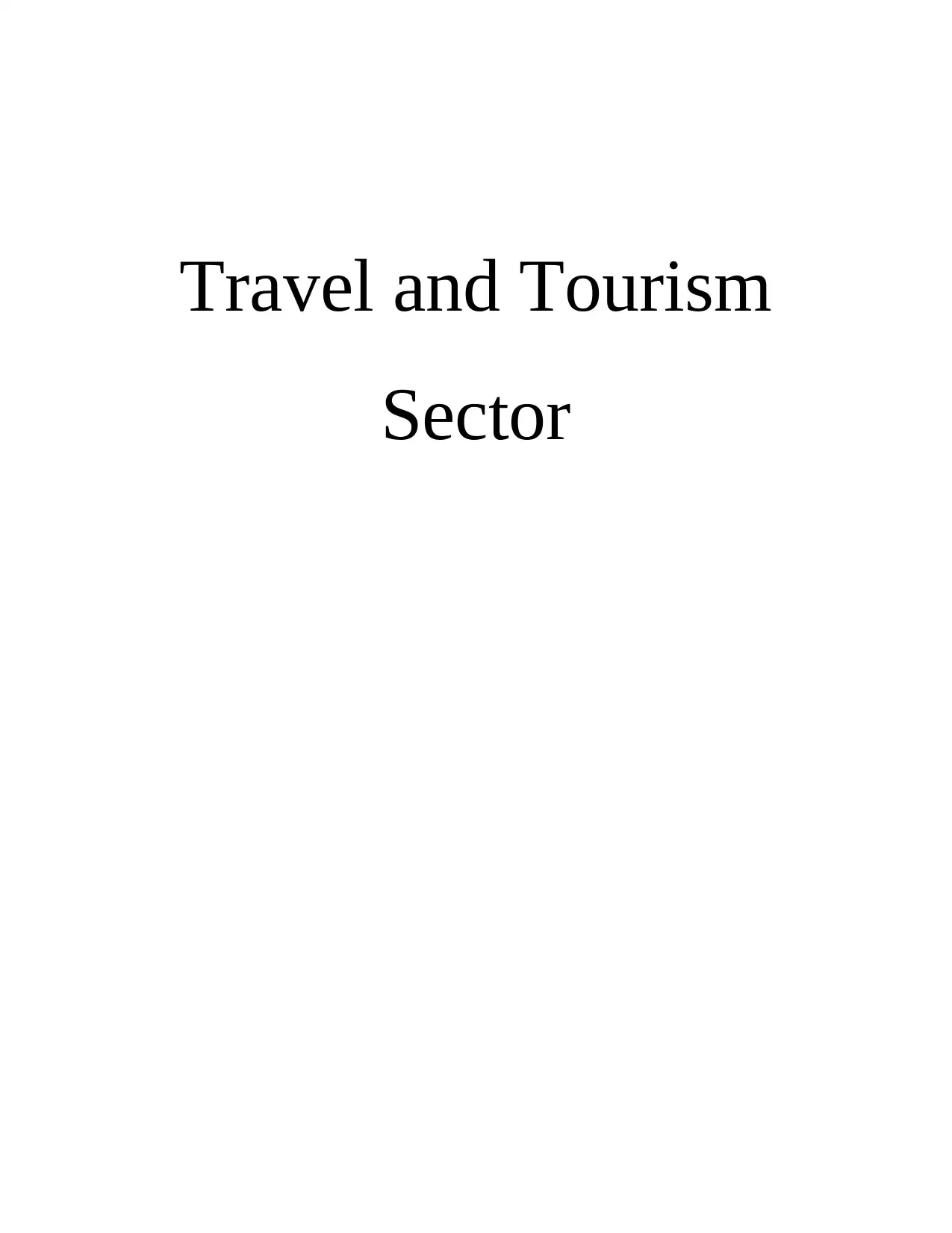
Travel and Tourism
Sector
Sector
Paraphrase This Document
Need a fresh take? Get an instant paraphrase of this document with our AI Paraphraser
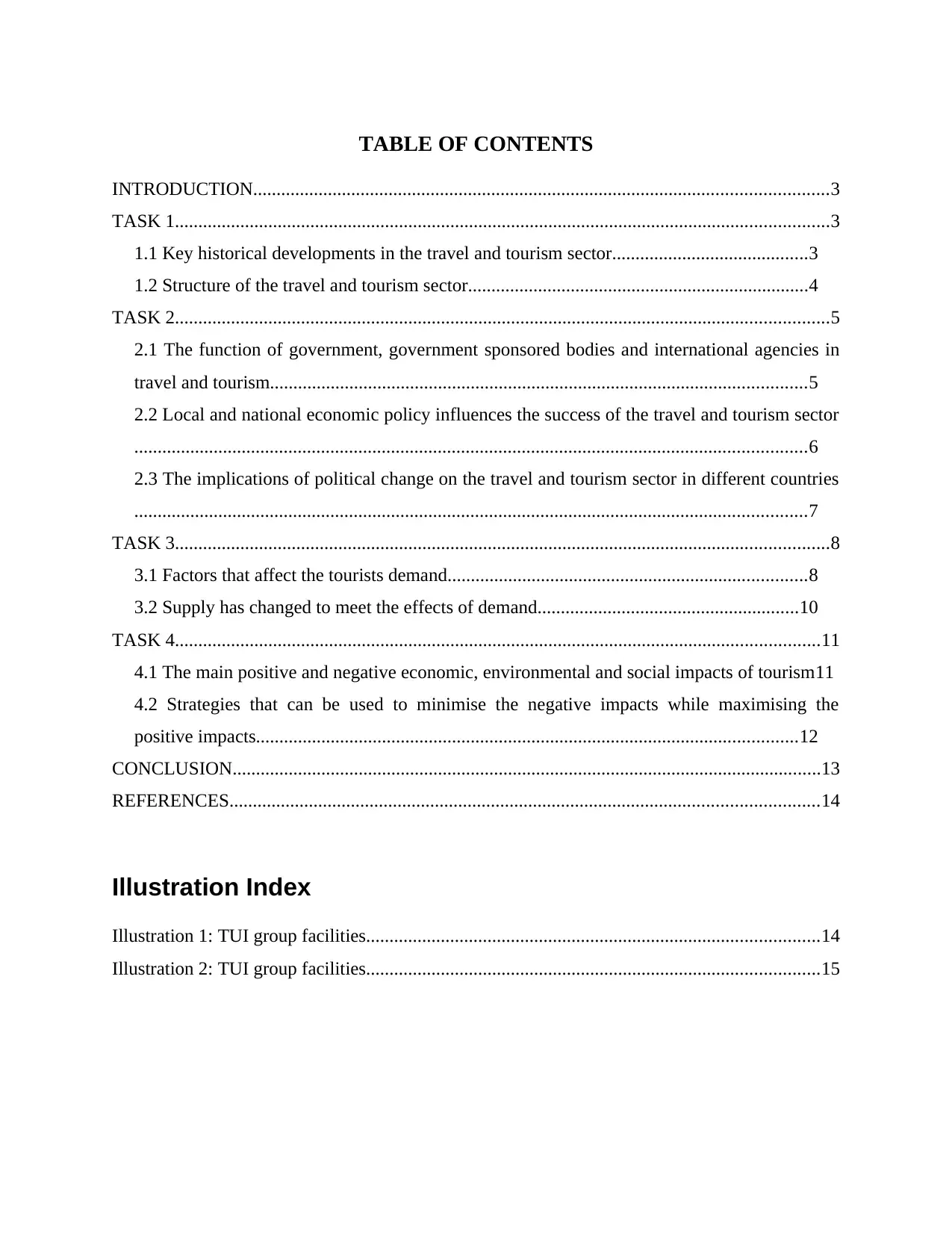
TABLE OF CONTENTS
INTRODUCTION...........................................................................................................................3
TASK 1............................................................................................................................................3
1.1 Key historical developments in the travel and tourism sector..........................................3
1.2 Structure of the travel and tourism sector.........................................................................4
TASK 2............................................................................................................................................5
2.1 The function of government, government sponsored bodies and international agencies in
travel and tourism...................................................................................................................5
2.2 Local and national economic policy influences the success of the travel and tourism sector
................................................................................................................................................6
2.3 The implications of political change on the travel and tourism sector in different countries
................................................................................................................................................7
TASK 3............................................................................................................................................8
3.1 Factors that affect the tourists demand.............................................................................8
3.2 Supply has changed to meet the effects of demand........................................................10
TASK 4..........................................................................................................................................11
4.1 The main positive and negative economic, environmental and social impacts of tourism11
4.2 Strategies that can be used to minimise the negative impacts while maximising the
positive impacts....................................................................................................................12
CONCLUSION..............................................................................................................................13
REFERENCES..............................................................................................................................14
Illustration Index
Illustration 1: TUI group facilities.................................................................................................14
Illustration 2: TUI group facilities.................................................................................................15
INTRODUCTION...........................................................................................................................3
TASK 1............................................................................................................................................3
1.1 Key historical developments in the travel and tourism sector..........................................3
1.2 Structure of the travel and tourism sector.........................................................................4
TASK 2............................................................................................................................................5
2.1 The function of government, government sponsored bodies and international agencies in
travel and tourism...................................................................................................................5
2.2 Local and national economic policy influences the success of the travel and tourism sector
................................................................................................................................................6
2.3 The implications of political change on the travel and tourism sector in different countries
................................................................................................................................................7
TASK 3............................................................................................................................................8
3.1 Factors that affect the tourists demand.............................................................................8
3.2 Supply has changed to meet the effects of demand........................................................10
TASK 4..........................................................................................................................................11
4.1 The main positive and negative economic, environmental and social impacts of tourism11
4.2 Strategies that can be used to minimise the negative impacts while maximising the
positive impacts....................................................................................................................12
CONCLUSION..............................................................................................................................13
REFERENCES..............................................................................................................................14
Illustration Index
Illustration 1: TUI group facilities.................................................................................................14
Illustration 2: TUI group facilities.................................................................................................15
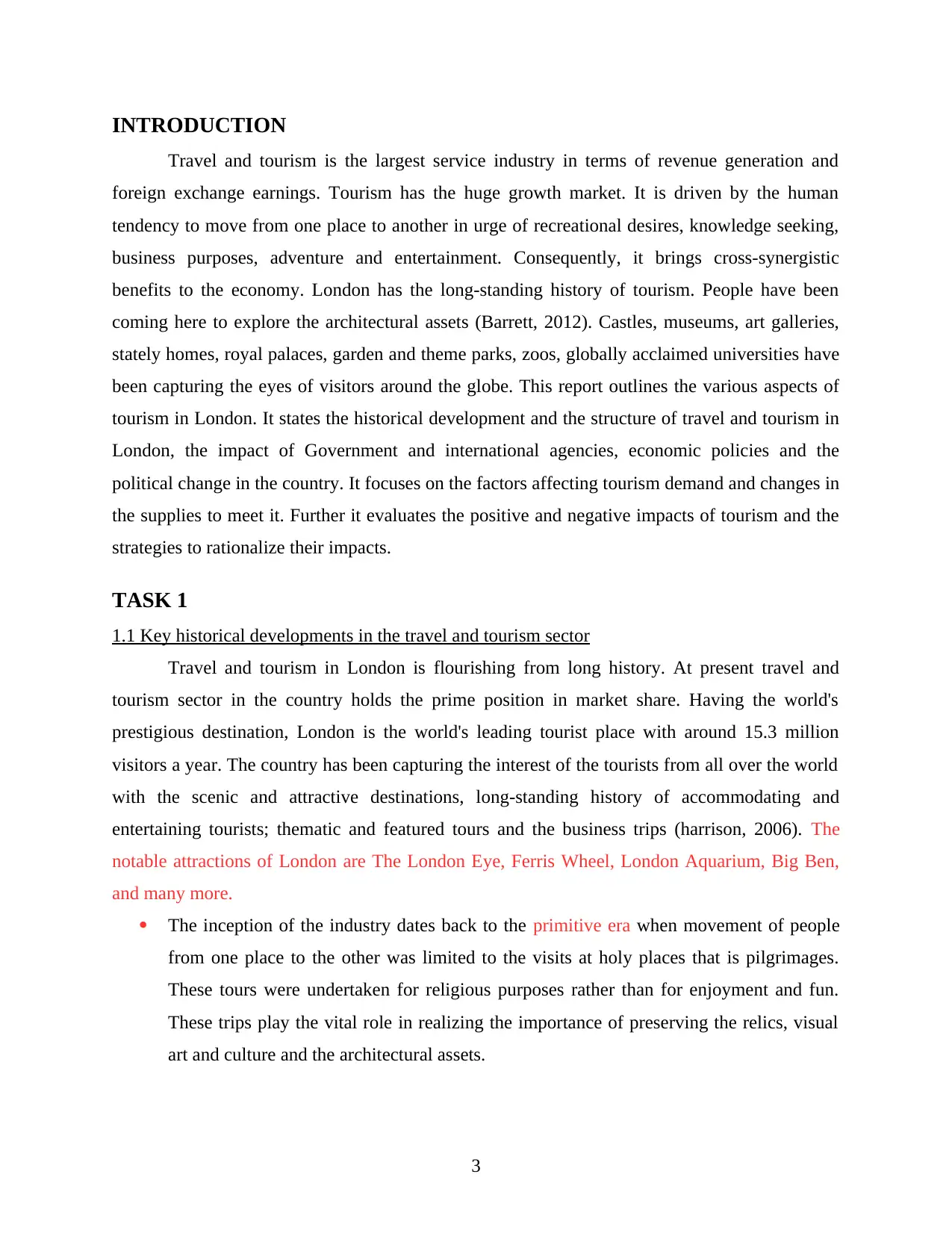
INTRODUCTION
Travel and tourism is the largest service industry in terms of revenue generation and
foreign exchange earnings. Tourism has the huge growth market. It is driven by the human
tendency to move from one place to another in urge of recreational desires, knowledge seeking,
business purposes, adventure and entertainment. Consequently, it brings cross-synergistic
benefits to the economy. London has the long-standing history of tourism. People have been
coming here to explore the architectural assets (Barrett, 2012). Castles, museums, art galleries,
stately homes, royal palaces, garden and theme parks, zoos, globally acclaimed universities have
been capturing the eyes of visitors around the globe. This report outlines the various aspects of
tourism in London. It states the historical development and the structure of travel and tourism in
London, the impact of Government and international agencies, economic policies and the
political change in the country. It focuses on the factors affecting tourism demand and changes in
the supplies to meet it. Further it evaluates the positive and negative impacts of tourism and the
strategies to rationalize their impacts.
TASK 1
1.1 Key historical developments in the travel and tourism sector
Travel and tourism in London is flourishing from long history. At present travel and
tourism sector in the country holds the prime position in market share. Having the world's
prestigious destination, London is the world's leading tourist place with around 15.3 million
visitors a year. The country has been capturing the interest of the tourists from all over the world
with the scenic and attractive destinations, long-standing history of accommodating and
entertaining tourists; thematic and featured tours and the business trips (harrison, 2006). The
notable attractions of London are The London Eye, Ferris Wheel, London Aquarium, Big Ben,
and many more.
The inception of the industry dates back to the primitive era when movement of people
from one place to the other was limited to the visits at holy places that is pilgrimages.
These tours were undertaken for religious purposes rather than for enjoyment and fun.
These trips play the vital role in realizing the importance of preserving the relics, visual
art and culture and the architectural assets.
3
Travel and tourism is the largest service industry in terms of revenue generation and
foreign exchange earnings. Tourism has the huge growth market. It is driven by the human
tendency to move from one place to another in urge of recreational desires, knowledge seeking,
business purposes, adventure and entertainment. Consequently, it brings cross-synergistic
benefits to the economy. London has the long-standing history of tourism. People have been
coming here to explore the architectural assets (Barrett, 2012). Castles, museums, art galleries,
stately homes, royal palaces, garden and theme parks, zoos, globally acclaimed universities have
been capturing the eyes of visitors around the globe. This report outlines the various aspects of
tourism in London. It states the historical development and the structure of travel and tourism in
London, the impact of Government and international agencies, economic policies and the
political change in the country. It focuses on the factors affecting tourism demand and changes in
the supplies to meet it. Further it evaluates the positive and negative impacts of tourism and the
strategies to rationalize their impacts.
TASK 1
1.1 Key historical developments in the travel and tourism sector
Travel and tourism in London is flourishing from long history. At present travel and
tourism sector in the country holds the prime position in market share. Having the world's
prestigious destination, London is the world's leading tourist place with around 15.3 million
visitors a year. The country has been capturing the interest of the tourists from all over the world
with the scenic and attractive destinations, long-standing history of accommodating and
entertaining tourists; thematic and featured tours and the business trips (harrison, 2006). The
notable attractions of London are The London Eye, Ferris Wheel, London Aquarium, Big Ben,
and many more.
The inception of the industry dates back to the primitive era when movement of people
from one place to the other was limited to the visits at holy places that is pilgrimages.
These tours were undertaken for religious purposes rather than for enjoyment and fun.
These trips play the vital role in realizing the importance of preserving the relics, visual
art and culture and the architectural assets.
3
⊘ This is a preview!⊘
Do you want full access?
Subscribe today to unlock all pages.

Trusted by 1+ million students worldwide
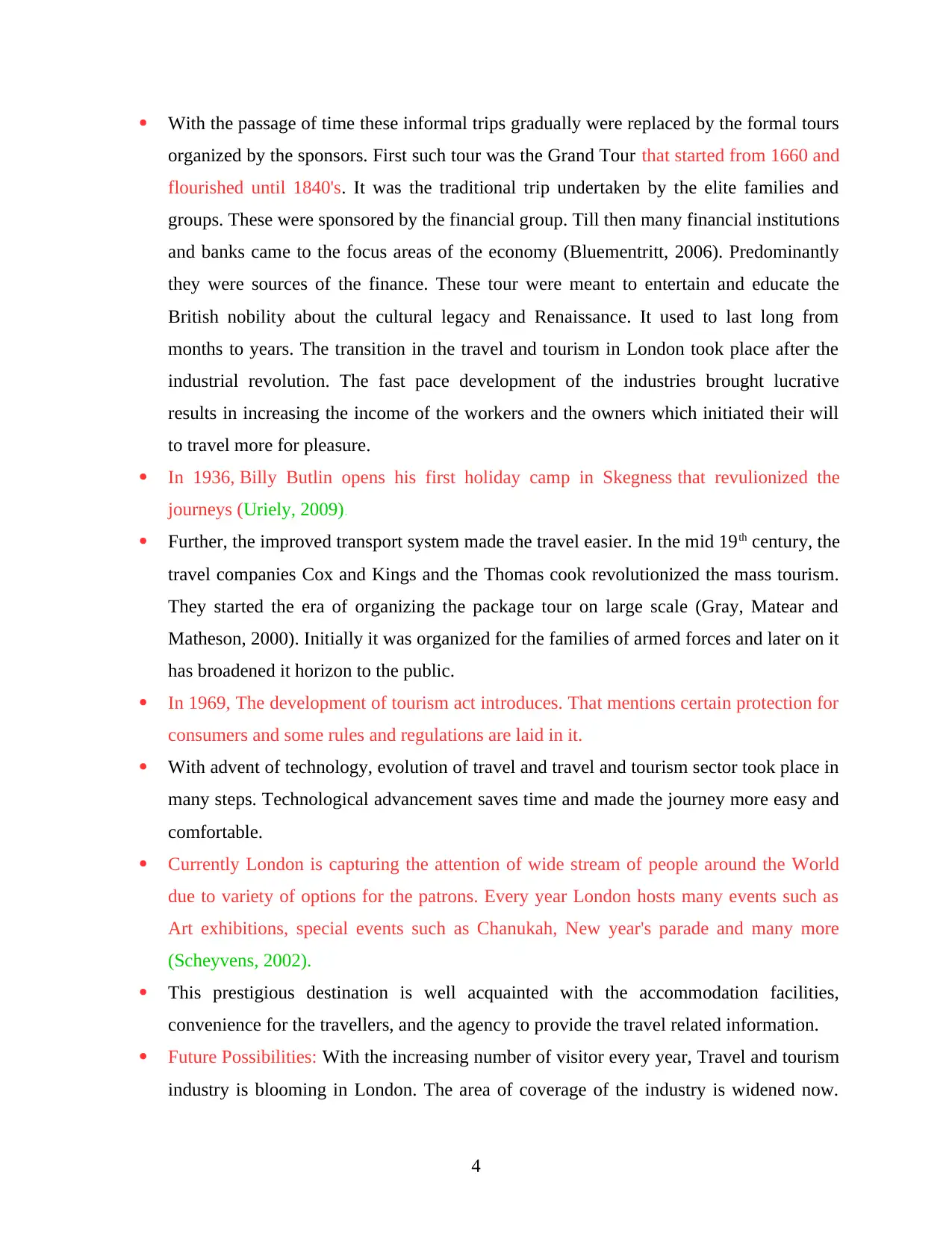
With the passage of time these informal trips gradually were replaced by the formal tours
organized by the sponsors. First such tour was the Grand Tour that started from 1660 and
flourished until 1840's. It was the traditional trip undertaken by the elite families and
groups. These were sponsored by the financial group. Till then many financial institutions
and banks came to the focus areas of the economy (Bluementritt, 2006). Predominantly
they were sources of the finance. These tour were meant to entertain and educate the
British nobility about the cultural legacy and Renaissance. It used to last long from
months to years. The transition in the travel and tourism in London took place after the
industrial revolution. The fast pace development of the industries brought lucrative
results in increasing the income of the workers and the owners which initiated their will
to travel more for pleasure.
In 1936, Billy Butlin opens his first holiday camp in Skegness that revulionized the
journeys (Uriely, 2009).
Further, the improved transport system made the travel easier. In the mid 19th century, the
travel companies Cox and Kings and the Thomas cook revolutionized the mass tourism.
They started the era of organizing the package tour on large scale (Gray, Matear and
Matheson, 2000). Initially it was organized for the families of armed forces and later on it
has broadened it horizon to the public.
In 1969, The development of tourism act introduces. That mentions certain protection for
consumers and some rules and regulations are laid in it.
With advent of technology, evolution of travel and travel and tourism sector took place in
many steps. Technological advancement saves time and made the journey more easy and
comfortable.
Currently London is capturing the attention of wide stream of people around the World
due to variety of options for the patrons. Every year London hosts many events such as
Art exhibitions, special events such as Chanukah, New year's parade and many more
(Scheyvens, 2002).
This prestigious destination is well acquainted with the accommodation facilities,
convenience for the travellers, and the agency to provide the travel related information.
Future Possibilities: With the increasing number of visitor every year, Travel and tourism
industry is blooming in London. The area of coverage of the industry is widened now.
4
organized by the sponsors. First such tour was the Grand Tour that started from 1660 and
flourished until 1840's. It was the traditional trip undertaken by the elite families and
groups. These were sponsored by the financial group. Till then many financial institutions
and banks came to the focus areas of the economy (Bluementritt, 2006). Predominantly
they were sources of the finance. These tour were meant to entertain and educate the
British nobility about the cultural legacy and Renaissance. It used to last long from
months to years. The transition in the travel and tourism in London took place after the
industrial revolution. The fast pace development of the industries brought lucrative
results in increasing the income of the workers and the owners which initiated their will
to travel more for pleasure.
In 1936, Billy Butlin opens his first holiday camp in Skegness that revulionized the
journeys (Uriely, 2009).
Further, the improved transport system made the travel easier. In the mid 19th century, the
travel companies Cox and Kings and the Thomas cook revolutionized the mass tourism.
They started the era of organizing the package tour on large scale (Gray, Matear and
Matheson, 2000). Initially it was organized for the families of armed forces and later on it
has broadened it horizon to the public.
In 1969, The development of tourism act introduces. That mentions certain protection for
consumers and some rules and regulations are laid in it.
With advent of technology, evolution of travel and travel and tourism sector took place in
many steps. Technological advancement saves time and made the journey more easy and
comfortable.
Currently London is capturing the attention of wide stream of people around the World
due to variety of options for the patrons. Every year London hosts many events such as
Art exhibitions, special events such as Chanukah, New year's parade and many more
(Scheyvens, 2002).
This prestigious destination is well acquainted with the accommodation facilities,
convenience for the travellers, and the agency to provide the travel related information.
Future Possibilities: With the increasing number of visitor every year, Travel and tourism
industry is blooming in London. The area of coverage of the industry is widened now.
4
Paraphrase This Document
Need a fresh take? Get an instant paraphrase of this document with our AI Paraphraser
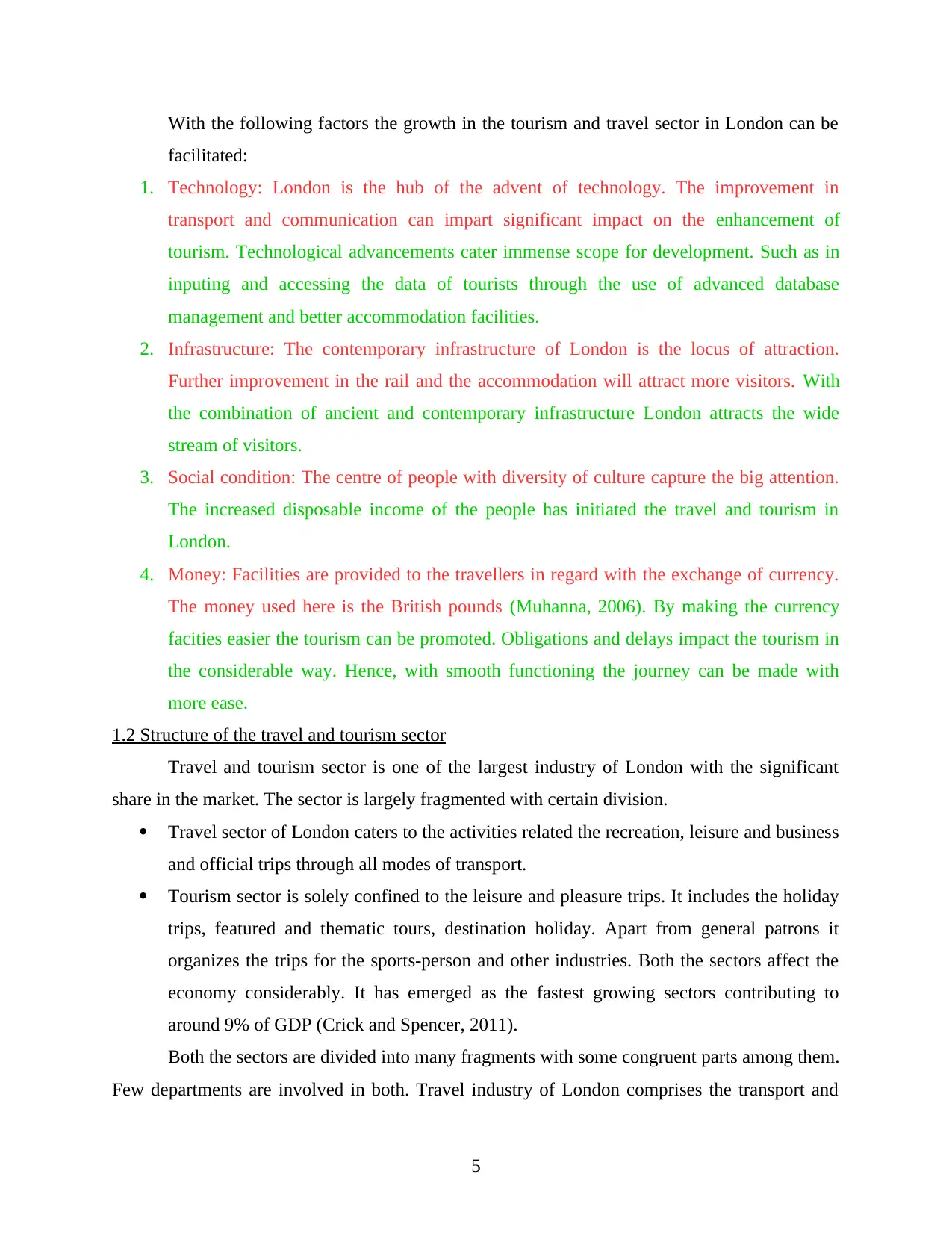
With the following factors the growth in the tourism and travel sector in London can be
facilitated:
1. Technology: London is the hub of the advent of technology. The improvement in
transport and communication can impart significant impact on the enhancement of
tourism. Technological advancements cater immense scope for development. Such as in
inputing and accessing the data of tourists through the use of advanced database
management and better accommodation facilities.
2. Infrastructure: The contemporary infrastructure of London is the locus of attraction.
Further improvement in the rail and the accommodation will attract more visitors. With
the combination of ancient and contemporary infrastructure London attracts the wide
stream of visitors.
3. Social condition: The centre of people with diversity of culture capture the big attention.
The increased disposable income of the people has initiated the travel and tourism in
London.
4. Money: Facilities are provided to the travellers in regard with the exchange of currency.
The money used here is the British pounds (Muhanna, 2006). By making the currency
facities easier the tourism can be promoted. Obligations and delays impact the tourism in
the considerable way. Hence, with smooth functioning the journey can be made with
more ease.
1.2 Structure of the travel and tourism sector
Travel and tourism sector is one of the largest industry of London with the significant
share in the market. The sector is largely fragmented with certain division.
Travel sector of London caters to the activities related the recreation, leisure and business
and official trips through all modes of transport.
Tourism sector is solely confined to the leisure and pleasure trips. It includes the holiday
trips, featured and thematic tours, destination holiday. Apart from general patrons it
organizes the trips for the sports-person and other industries. Both the sectors affect the
economy considerably. It has emerged as the fastest growing sectors contributing to
around 9% of GDP (Crick and Spencer, 2011).
Both the sectors are divided into many fragments with some congruent parts among them.
Few departments are involved in both. Travel industry of London comprises the transport and
5
facilitated:
1. Technology: London is the hub of the advent of technology. The improvement in
transport and communication can impart significant impact on the enhancement of
tourism. Technological advancements cater immense scope for development. Such as in
inputing and accessing the data of tourists through the use of advanced database
management and better accommodation facilities.
2. Infrastructure: The contemporary infrastructure of London is the locus of attraction.
Further improvement in the rail and the accommodation will attract more visitors. With
the combination of ancient and contemporary infrastructure London attracts the wide
stream of visitors.
3. Social condition: The centre of people with diversity of culture capture the big attention.
The increased disposable income of the people has initiated the travel and tourism in
London.
4. Money: Facilities are provided to the travellers in regard with the exchange of currency.
The money used here is the British pounds (Muhanna, 2006). By making the currency
facities easier the tourism can be promoted. Obligations and delays impact the tourism in
the considerable way. Hence, with smooth functioning the journey can be made with
more ease.
1.2 Structure of the travel and tourism sector
Travel and tourism sector is one of the largest industry of London with the significant
share in the market. The sector is largely fragmented with certain division.
Travel sector of London caters to the activities related the recreation, leisure and business
and official trips through all modes of transport.
Tourism sector is solely confined to the leisure and pleasure trips. It includes the holiday
trips, featured and thematic tours, destination holiday. Apart from general patrons it
organizes the trips for the sports-person and other industries. Both the sectors affect the
economy considerably. It has emerged as the fastest growing sectors contributing to
around 9% of GDP (Crick and Spencer, 2011).
Both the sectors are divided into many fragments with some congruent parts among them.
Few departments are involved in both. Travel industry of London comprises the transport and
5
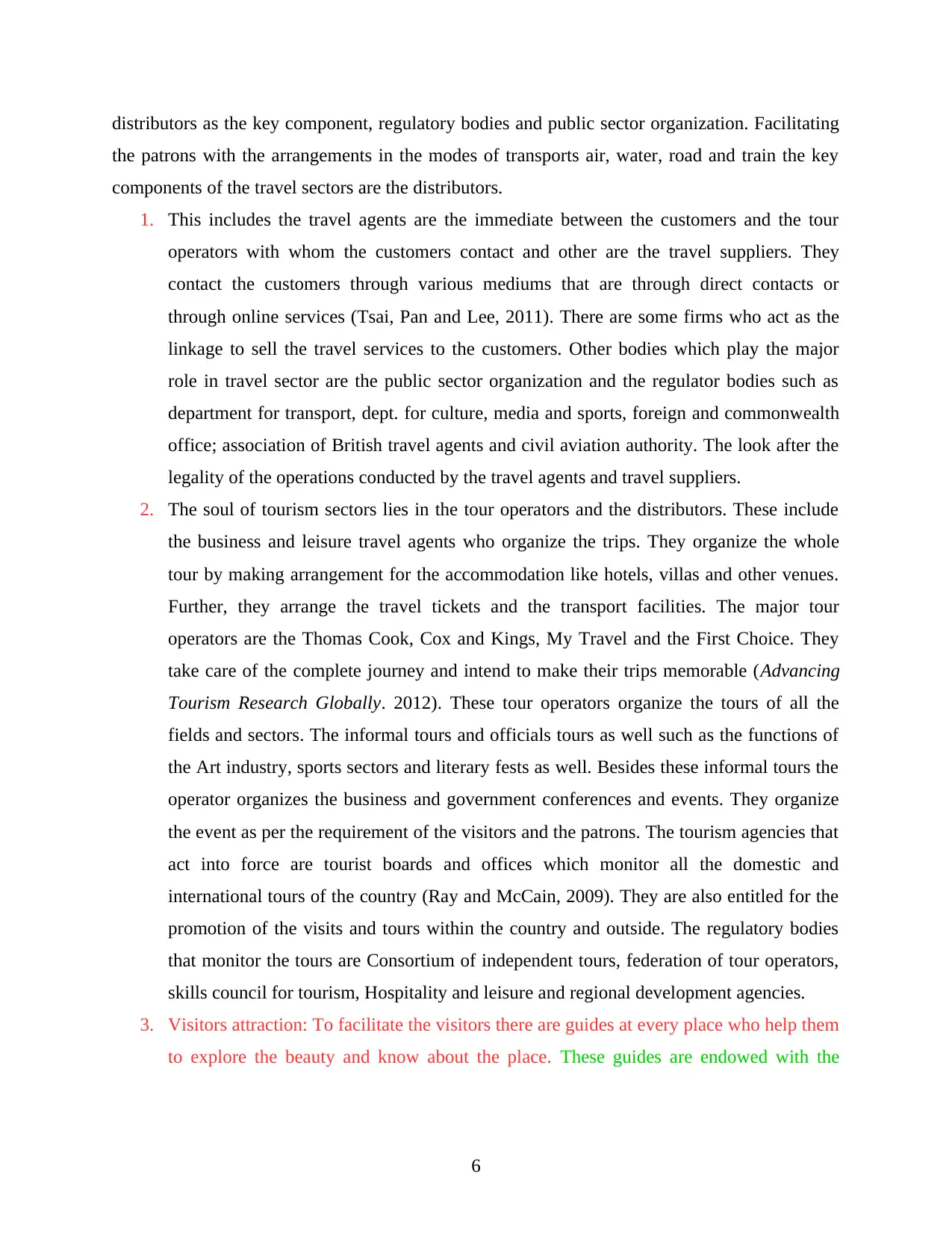
distributors as the key component, regulatory bodies and public sector organization. Facilitating
the patrons with the arrangements in the modes of transports air, water, road and train the key
components of the travel sectors are the distributors.
1. This includes the travel agents are the immediate between the customers and the tour
operators with whom the customers contact and other are the travel suppliers. They
contact the customers through various mediums that are through direct contacts or
through online services (Tsai, Pan and Lee, 2011). There are some firms who act as the
linkage to sell the travel services to the customers. Other bodies which play the major
role in travel sector are the public sector organization and the regulator bodies such as
department for transport, dept. for culture, media and sports, foreign and commonwealth
office; association of British travel agents and civil aviation authority. The look after the
legality of the operations conducted by the travel agents and travel suppliers.
2. The soul of tourism sectors lies in the tour operators and the distributors. These include
the business and leisure travel agents who organize the trips. They organize the whole
tour by making arrangement for the accommodation like hotels, villas and other venues.
Further, they arrange the travel tickets and the transport facilities. The major tour
operators are the Thomas Cook, Cox and Kings, My Travel and the First Choice. They
take care of the complete journey and intend to make their trips memorable (Advancing
Tourism Research Globally. 2012). These tour operators organize the tours of all the
fields and sectors. The informal tours and officials tours as well such as the functions of
the Art industry, sports sectors and literary fests as well. Besides these informal tours the
operator organizes the business and government conferences and events. They organize
the event as per the requirement of the visitors and the patrons. The tourism agencies that
act into force are tourist boards and offices which monitor all the domestic and
international tours of the country (Ray and McCain, 2009). They are also entitled for the
promotion of the visits and tours within the country and outside. The regulatory bodies
that monitor the tours are Consortium of independent tours, federation of tour operators,
skills council for tourism, Hospitality and leisure and regional development agencies.
3. Visitors attraction: To facilitate the visitors there are guides at every place who help them
to explore the beauty and know about the place. These guides are endowed with the
6
the patrons with the arrangements in the modes of transports air, water, road and train the key
components of the travel sectors are the distributors.
1. This includes the travel agents are the immediate between the customers and the tour
operators with whom the customers contact and other are the travel suppliers. They
contact the customers through various mediums that are through direct contacts or
through online services (Tsai, Pan and Lee, 2011). There are some firms who act as the
linkage to sell the travel services to the customers. Other bodies which play the major
role in travel sector are the public sector organization and the regulator bodies such as
department for transport, dept. for culture, media and sports, foreign and commonwealth
office; association of British travel agents and civil aviation authority. The look after the
legality of the operations conducted by the travel agents and travel suppliers.
2. The soul of tourism sectors lies in the tour operators and the distributors. These include
the business and leisure travel agents who organize the trips. They organize the whole
tour by making arrangement for the accommodation like hotels, villas and other venues.
Further, they arrange the travel tickets and the transport facilities. The major tour
operators are the Thomas Cook, Cox and Kings, My Travel and the First Choice. They
take care of the complete journey and intend to make their trips memorable (Advancing
Tourism Research Globally. 2012). These tour operators organize the tours of all the
fields and sectors. The informal tours and officials tours as well such as the functions of
the Art industry, sports sectors and literary fests as well. Besides these informal tours the
operator organizes the business and government conferences and events. They organize
the event as per the requirement of the visitors and the patrons. The tourism agencies that
act into force are tourist boards and offices which monitor all the domestic and
international tours of the country (Ray and McCain, 2009). They are also entitled for the
promotion of the visits and tours within the country and outside. The regulatory bodies
that monitor the tours are Consortium of independent tours, federation of tour operators,
skills council for tourism, Hospitality and leisure and regional development agencies.
3. Visitors attraction: To facilitate the visitors there are guides at every place who help them
to explore the beauty and know about the place. These guides are endowed with the
6
⊘ This is a preview!⊘
Do you want full access?
Subscribe today to unlock all pages.

Trusted by 1+ million students worldwide
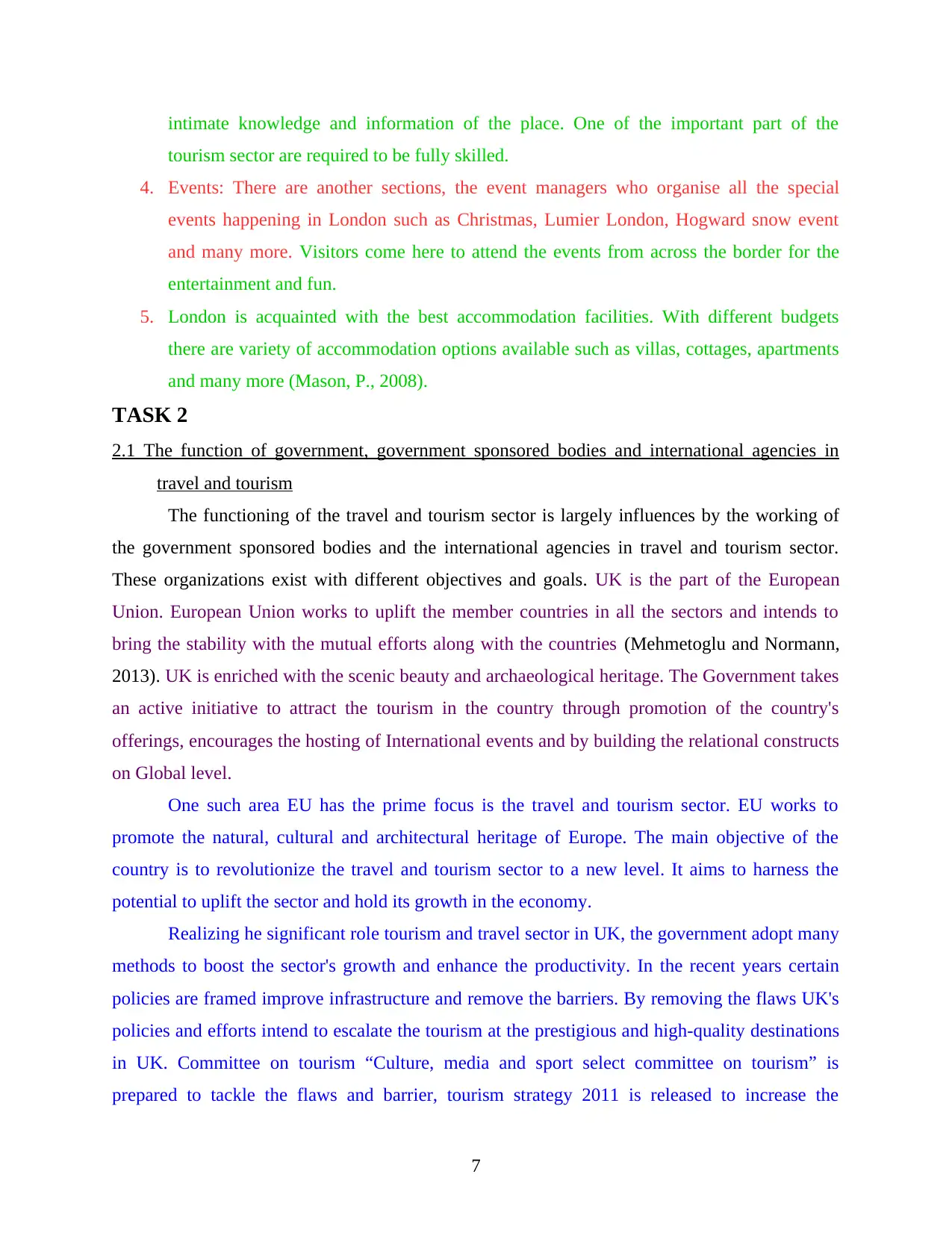
intimate knowledge and information of the place. One of the important part of the
tourism sector are required to be fully skilled.
4. Events: There are another sections, the event managers who organise all the special
events happening in London such as Christmas, Lumier London, Hogward snow event
and many more. Visitors come here to attend the events from across the border for the
entertainment and fun.
5. London is acquainted with the best accommodation facilities. With different budgets
there are variety of accommodation options available such as villas, cottages, apartments
and many more (Mason, P., 2008).
TASK 2
2.1 The function of government, government sponsored bodies and international agencies in
travel and tourism
The functioning of the travel and tourism sector is largely influences by the working of
the government sponsored bodies and the international agencies in travel and tourism sector.
These organizations exist with different objectives and goals. UK is the part of the European
Union. European Union works to uplift the member countries in all the sectors and intends to
bring the stability with the mutual efforts along with the countries (Mehmetoglu and Normann,
2013). UK is enriched with the scenic beauty and archaeological heritage. The Government takes
an active initiative to attract the tourism in the country through promotion of the country's
offerings, encourages the hosting of International events and by building the relational constructs
on Global level.
One such area EU has the prime focus is the travel and tourism sector. EU works to
promote the natural, cultural and architectural heritage of Europe. The main objective of the
country is to revolutionize the travel and tourism sector to a new level. It aims to harness the
potential to uplift the sector and hold its growth in the economy.
Realizing he significant role tourism and travel sector in UK, the government adopt many
methods to boost the sector's growth and enhance the productivity. In the recent years certain
policies are framed improve infrastructure and remove the barriers. By removing the flaws UK's
policies and efforts intend to escalate the tourism at the prestigious and high-quality destinations
in UK. Committee on tourism “Culture, media and sport select committee on tourism” is
prepared to tackle the flaws and barrier, tourism strategy 2011 is released to increase the
7
tourism sector are required to be fully skilled.
4. Events: There are another sections, the event managers who organise all the special
events happening in London such as Christmas, Lumier London, Hogward snow event
and many more. Visitors come here to attend the events from across the border for the
entertainment and fun.
5. London is acquainted with the best accommodation facilities. With different budgets
there are variety of accommodation options available such as villas, cottages, apartments
and many more (Mason, P., 2008).
TASK 2
2.1 The function of government, government sponsored bodies and international agencies in
travel and tourism
The functioning of the travel and tourism sector is largely influences by the working of
the government sponsored bodies and the international agencies in travel and tourism sector.
These organizations exist with different objectives and goals. UK is the part of the European
Union. European Union works to uplift the member countries in all the sectors and intends to
bring the stability with the mutual efforts along with the countries (Mehmetoglu and Normann,
2013). UK is enriched with the scenic beauty and archaeological heritage. The Government takes
an active initiative to attract the tourism in the country through promotion of the country's
offerings, encourages the hosting of International events and by building the relational constructs
on Global level.
One such area EU has the prime focus is the travel and tourism sector. EU works to
promote the natural, cultural and architectural heritage of Europe. The main objective of the
country is to revolutionize the travel and tourism sector to a new level. It aims to harness the
potential to uplift the sector and hold its growth in the economy.
Realizing he significant role tourism and travel sector in UK, the government adopt many
methods to boost the sector's growth and enhance the productivity. In the recent years certain
policies are framed improve infrastructure and remove the barriers. By removing the flaws UK's
policies and efforts intend to escalate the tourism at the prestigious and high-quality destinations
in UK. Committee on tourism “Culture, media and sport select committee on tourism” is
prepared to tackle the flaws and barrier, tourism strategy 2011 is released to increase the
7
Paraphrase This Document
Need a fresh take? Get an instant paraphrase of this document with our AI Paraphraser
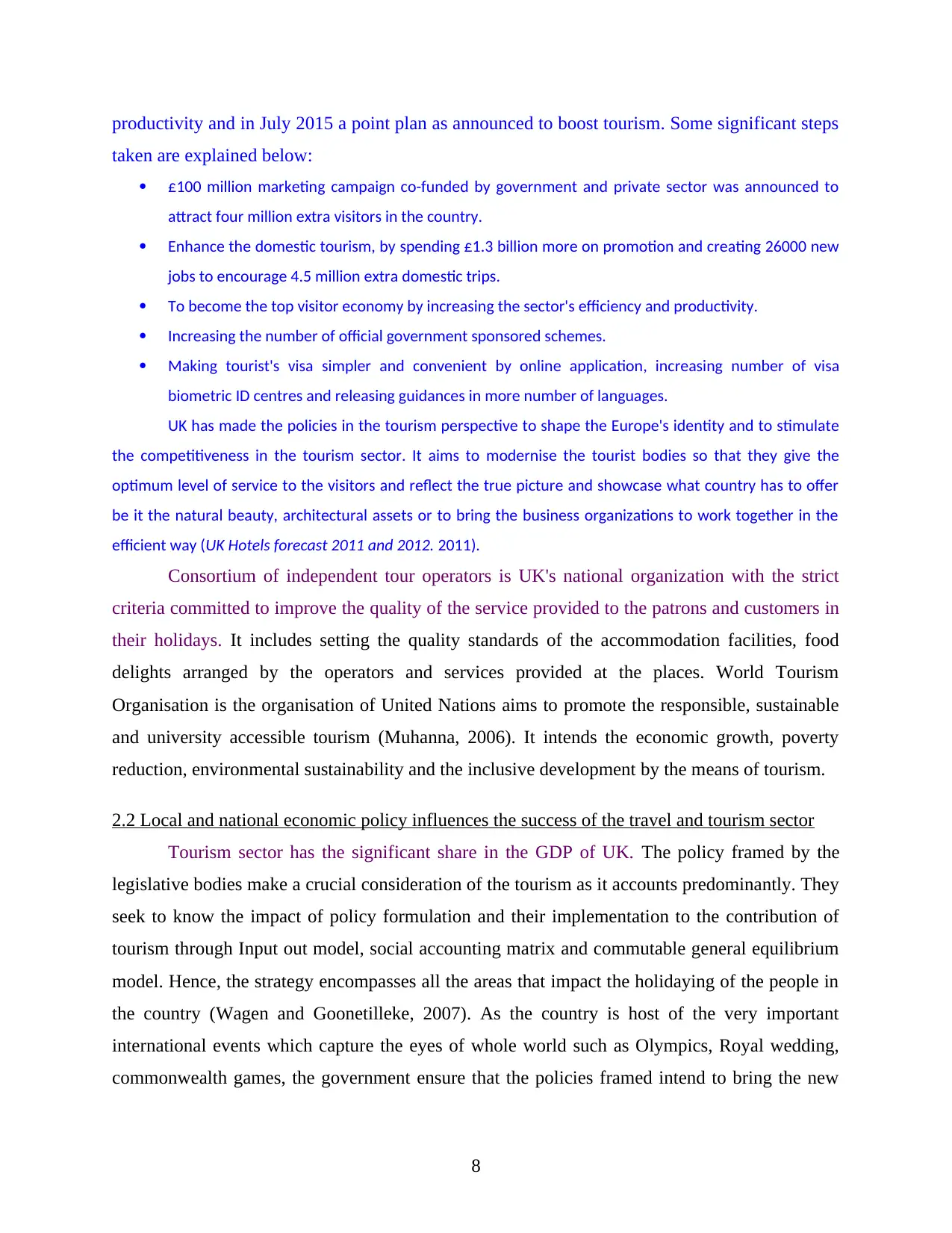
productivity and in July 2015 a point plan as announced to boost tourism. Some significant steps
taken are explained below:
£100 million marketing campaign co-funded by government and private sector was announced to
attract four million extra visitors in the country.
Enhance the domestic tourism, by spending £1.3 billion more on promotion and creating 26000 new
jobs to encourage 4.5 million extra domestic trips.
To become the top visitor economy by increasing the sector's efficiency and productivity.
Increasing the number of official government sponsored schemes.
Making tourist's visa simpler and convenient by online application, increasing number of visa
biometric ID centres and releasing guidances in more number of languages.
UK has made the policies in the tourism perspective to shape the Europe's identity and to stimulate
the competitiveness in the tourism sector. It aims to modernise the tourist bodies so that they give the
optimum level of service to the visitors and reflect the true picture and showcase what country has to offer
be it the natural beauty, architectural assets or to bring the business organizations to work together in the
efficient way (UK Hotels forecast 2011 and 2012. 2011).
Consortium of independent tour operators is UK's national organization with the strict
criteria committed to improve the quality of the service provided to the patrons and customers in
their holidays. It includes setting the quality standards of the accommodation facilities, food
delights arranged by the operators and services provided at the places. World Tourism
Organisation is the organisation of United Nations aims to promote the responsible, sustainable
and university accessible tourism (Muhanna, 2006). It intends the economic growth, poverty
reduction, environmental sustainability and the inclusive development by the means of tourism.
2.2 Local and national economic policy influences the success of the travel and tourism sector
Tourism sector has the significant share in the GDP of UK. The policy framed by the
legislative bodies make a crucial consideration of the tourism as it accounts predominantly. They
seek to know the impact of policy formulation and their implementation to the contribution of
tourism through Input out model, social accounting matrix and commutable general equilibrium
model. Hence, the strategy encompasses all the areas that impact the holidaying of the people in
the country (Wagen and Goonetilleke, 2007). As the country is host of the very important
international events which capture the eyes of whole world such as Olympics, Royal wedding,
commonwealth games, the government ensure that the policies framed intend to bring the new
8
taken are explained below:
£100 million marketing campaign co-funded by government and private sector was announced to
attract four million extra visitors in the country.
Enhance the domestic tourism, by spending £1.3 billion more on promotion and creating 26000 new
jobs to encourage 4.5 million extra domestic trips.
To become the top visitor economy by increasing the sector's efficiency and productivity.
Increasing the number of official government sponsored schemes.
Making tourist's visa simpler and convenient by online application, increasing number of visa
biometric ID centres and releasing guidances in more number of languages.
UK has made the policies in the tourism perspective to shape the Europe's identity and to stimulate
the competitiveness in the tourism sector. It aims to modernise the tourist bodies so that they give the
optimum level of service to the visitors and reflect the true picture and showcase what country has to offer
be it the natural beauty, architectural assets or to bring the business organizations to work together in the
efficient way (UK Hotels forecast 2011 and 2012. 2011).
Consortium of independent tour operators is UK's national organization with the strict
criteria committed to improve the quality of the service provided to the patrons and customers in
their holidays. It includes setting the quality standards of the accommodation facilities, food
delights arranged by the operators and services provided at the places. World Tourism
Organisation is the organisation of United Nations aims to promote the responsible, sustainable
and university accessible tourism (Muhanna, 2006). It intends the economic growth, poverty
reduction, environmental sustainability and the inclusive development by the means of tourism.
2.2 Local and national economic policy influences the success of the travel and tourism sector
Tourism sector has the significant share in the GDP of UK. The policy framed by the
legislative bodies make a crucial consideration of the tourism as it accounts predominantly. They
seek to know the impact of policy formulation and their implementation to the contribution of
tourism through Input out model, social accounting matrix and commutable general equilibrium
model. Hence, the strategy encompasses all the areas that impact the holidaying of the people in
the country (Wagen and Goonetilleke, 2007). As the country is host of the very important
international events which capture the eyes of whole world such as Olympics, Royal wedding,
commonwealth games, the government ensure that the policies framed intend to bring the new
8
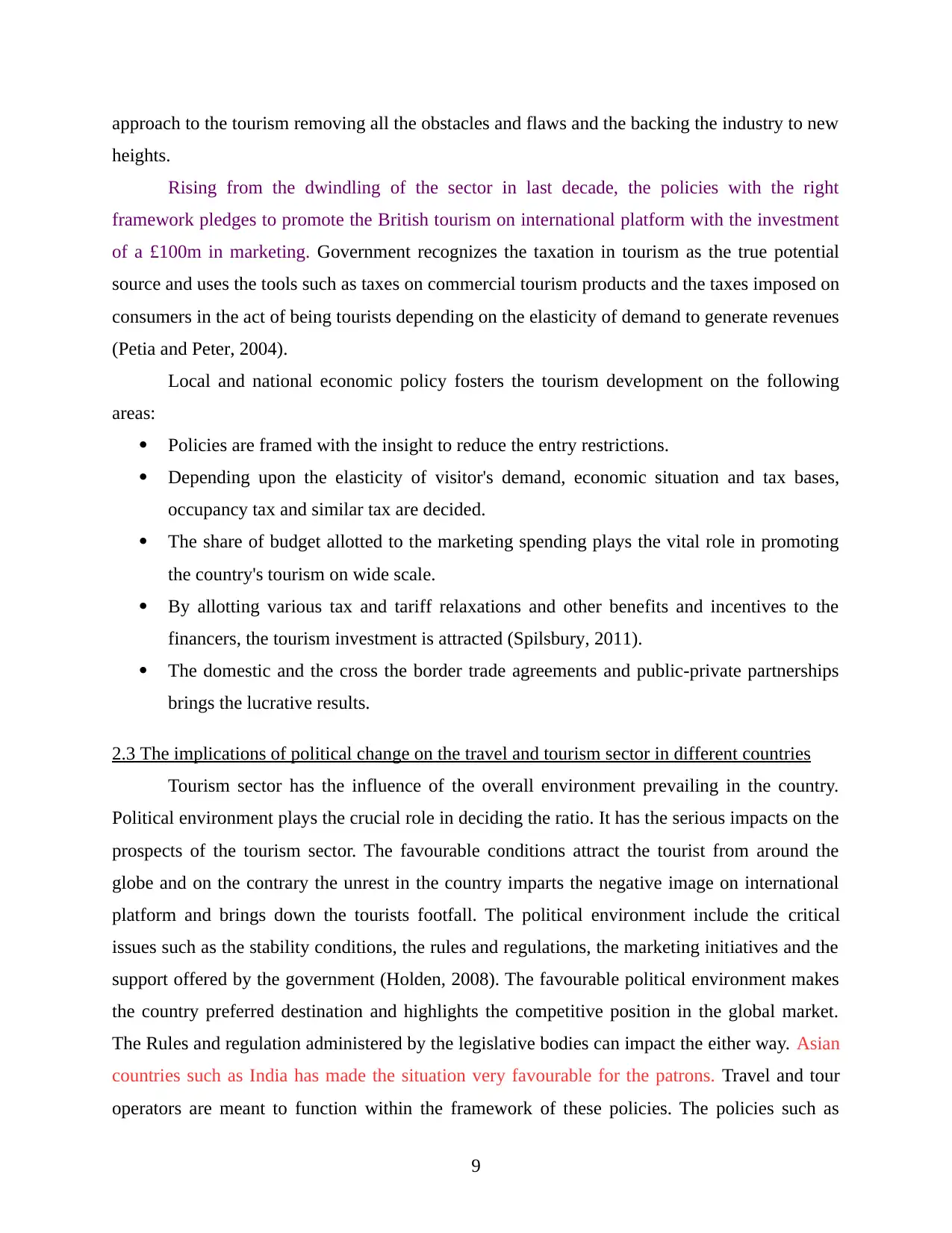
approach to the tourism removing all the obstacles and flaws and the backing the industry to new
heights.
Rising from the dwindling of the sector in last decade, the policies with the right
framework pledges to promote the British tourism on international platform with the investment
of a £100m in marketing. Government recognizes the taxation in tourism as the true potential
source and uses the tools such as taxes on commercial tourism products and the taxes imposed on
consumers in the act of being tourists depending on the elasticity of demand to generate revenues
(Petia and Peter, 2004).
Local and national economic policy fosters the tourism development on the following
areas:
Policies are framed with the insight to reduce the entry restrictions.
Depending upon the elasticity of visitor's demand, economic situation and tax bases,
occupancy tax and similar tax are decided.
The share of budget allotted to the marketing spending plays the vital role in promoting
the country's tourism on wide scale.
By allotting various tax and tariff relaxations and other benefits and incentives to the
financers, the tourism investment is attracted (Spilsbury, 2011).
The domestic and the cross the border trade agreements and public-private partnerships
brings the lucrative results.
2.3 The implications of political change on the travel and tourism sector in different countries
Tourism sector has the influence of the overall environment prevailing in the country.
Political environment plays the crucial role in deciding the ratio. It has the serious impacts on the
prospects of the tourism sector. The favourable conditions attract the tourist from around the
globe and on the contrary the unrest in the country imparts the negative image on international
platform and brings down the tourists footfall. The political environment include the critical
issues such as the stability conditions, the rules and regulations, the marketing initiatives and the
support offered by the government (Holden, 2008). The favourable political environment makes
the country preferred destination and highlights the competitive position in the global market.
The Rules and regulation administered by the legislative bodies can impact the either way. Asian
countries such as India has made the situation very favourable for the patrons. Travel and tour
operators are meant to function within the framework of these policies. The policies such as
9
heights.
Rising from the dwindling of the sector in last decade, the policies with the right
framework pledges to promote the British tourism on international platform with the investment
of a £100m in marketing. Government recognizes the taxation in tourism as the true potential
source and uses the tools such as taxes on commercial tourism products and the taxes imposed on
consumers in the act of being tourists depending on the elasticity of demand to generate revenues
(Petia and Peter, 2004).
Local and national economic policy fosters the tourism development on the following
areas:
Policies are framed with the insight to reduce the entry restrictions.
Depending upon the elasticity of visitor's demand, economic situation and tax bases,
occupancy tax and similar tax are decided.
The share of budget allotted to the marketing spending plays the vital role in promoting
the country's tourism on wide scale.
By allotting various tax and tariff relaxations and other benefits and incentives to the
financers, the tourism investment is attracted (Spilsbury, 2011).
The domestic and the cross the border trade agreements and public-private partnerships
brings the lucrative results.
2.3 The implications of political change on the travel and tourism sector in different countries
Tourism sector has the influence of the overall environment prevailing in the country.
Political environment plays the crucial role in deciding the ratio. It has the serious impacts on the
prospects of the tourism sector. The favourable conditions attract the tourist from around the
globe and on the contrary the unrest in the country imparts the negative image on international
platform and brings down the tourists footfall. The political environment include the critical
issues such as the stability conditions, the rules and regulations, the marketing initiatives and the
support offered by the government (Holden, 2008). The favourable political environment makes
the country preferred destination and highlights the competitive position in the global market.
The Rules and regulation administered by the legislative bodies can impact the either way. Asian
countries such as India has made the situation very favourable for the patrons. Travel and tour
operators are meant to function within the framework of these policies. The policies such as
9
⊘ This is a preview!⊘
Do you want full access?
Subscribe today to unlock all pages.

Trusted by 1+ million students worldwide
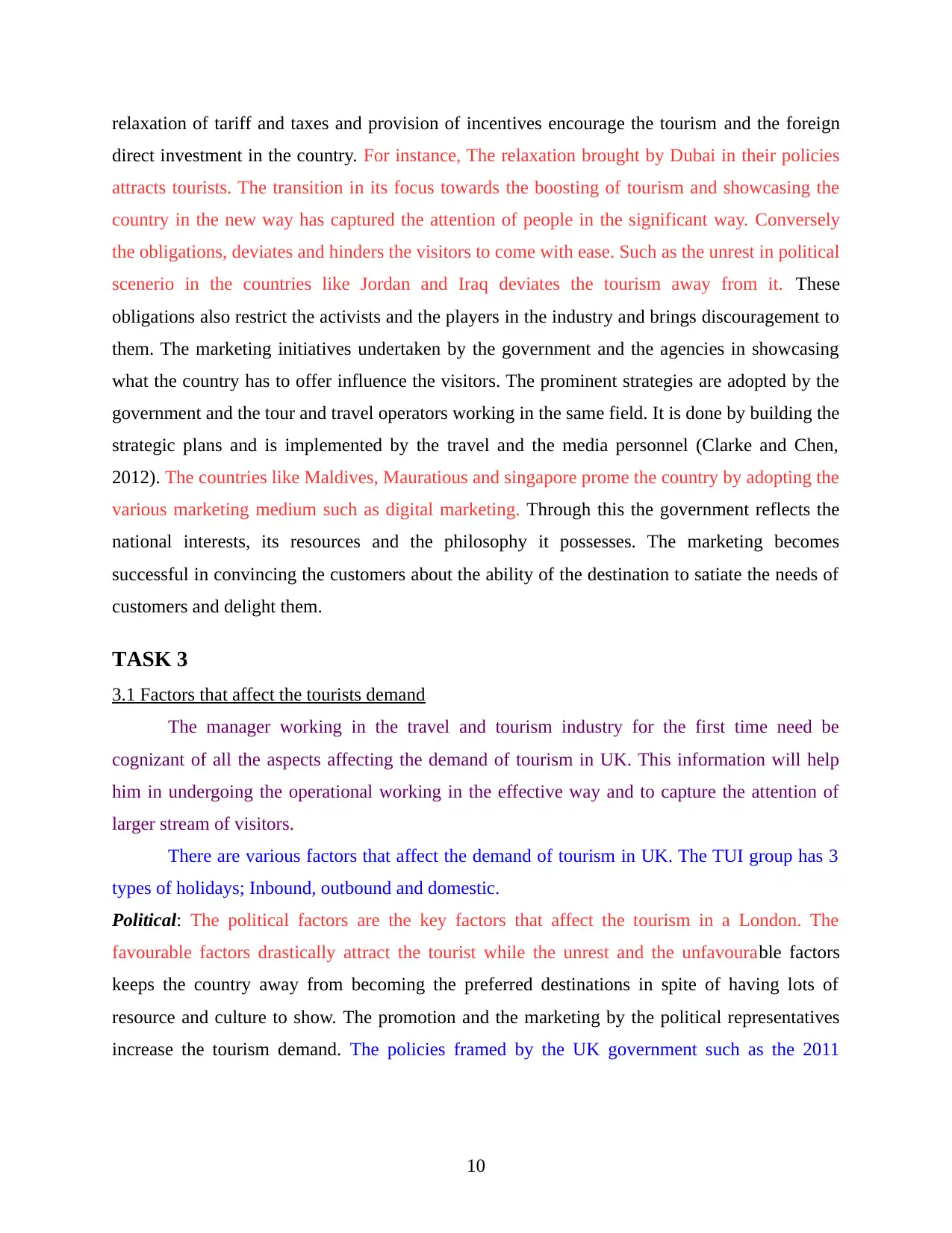
relaxation of tariff and taxes and provision of incentives encourage the tourism and the foreign
direct investment in the country. For instance, The relaxation brought by Dubai in their policies
attracts tourists. The transition in its focus towards the boosting of tourism and showcasing the
country in the new way has captured the attention of people in the significant way. Conversely
the obligations, deviates and hinders the visitors to come with ease. Such as the unrest in political
scenerio in the countries like Jordan and Iraq deviates the tourism away from it. These
obligations also restrict the activists and the players in the industry and brings discouragement to
them. The marketing initiatives undertaken by the government and the agencies in showcasing
what the country has to offer influence the visitors. The prominent strategies are adopted by the
government and the tour and travel operators working in the same field. It is done by building the
strategic plans and is implemented by the travel and the media personnel (Clarke and Chen,
2012). The countries like Maldives, Mauratious and singapore prome the country by adopting the
various marketing medium such as digital marketing. Through this the government reflects the
national interests, its resources and the philosophy it possesses. The marketing becomes
successful in convincing the customers about the ability of the destination to satiate the needs of
customers and delight them.
TASK 3
3.1 Factors that affect the tourists demand
The manager working in the travel and tourism industry for the first time need be
cognizant of all the aspects affecting the demand of tourism in UK. This information will help
him in undergoing the operational working in the effective way and to capture the attention of
larger stream of visitors.
There are various factors that affect the demand of tourism in UK. The TUI group has 3
types of holidays; Inbound, outbound and domestic.
Political: The political factors are the key factors that affect the tourism in a London. The
favourable factors drastically attract the tourist while the unrest and the unfavourable factors
keeps the country away from becoming the preferred destinations in spite of having lots of
resource and culture to show. The promotion and the marketing by the political representatives
increase the tourism demand. The policies framed by the UK government such as the 2011
10
direct investment in the country. For instance, The relaxation brought by Dubai in their policies
attracts tourists. The transition in its focus towards the boosting of tourism and showcasing the
country in the new way has captured the attention of people in the significant way. Conversely
the obligations, deviates and hinders the visitors to come with ease. Such as the unrest in political
scenerio in the countries like Jordan and Iraq deviates the tourism away from it. These
obligations also restrict the activists and the players in the industry and brings discouragement to
them. The marketing initiatives undertaken by the government and the agencies in showcasing
what the country has to offer influence the visitors. The prominent strategies are adopted by the
government and the tour and travel operators working in the same field. It is done by building the
strategic plans and is implemented by the travel and the media personnel (Clarke and Chen,
2012). The countries like Maldives, Mauratious and singapore prome the country by adopting the
various marketing medium such as digital marketing. Through this the government reflects the
national interests, its resources and the philosophy it possesses. The marketing becomes
successful in convincing the customers about the ability of the destination to satiate the needs of
customers and delight them.
TASK 3
3.1 Factors that affect the tourists demand
The manager working in the travel and tourism industry for the first time need be
cognizant of all the aspects affecting the demand of tourism in UK. This information will help
him in undergoing the operational working in the effective way and to capture the attention of
larger stream of visitors.
There are various factors that affect the demand of tourism in UK. The TUI group has 3
types of holidays; Inbound, outbound and domestic.
Political: The political factors are the key factors that affect the tourism in a London. The
favourable factors drastically attract the tourist while the unrest and the unfavourable factors
keeps the country away from becoming the preferred destinations in spite of having lots of
resource and culture to show. The promotion and the marketing by the political representatives
increase the tourism demand. The policies framed by the UK government such as the 2011
10
Paraphrase This Document
Need a fresh take? Get an instant paraphrase of this document with our AI Paraphraser
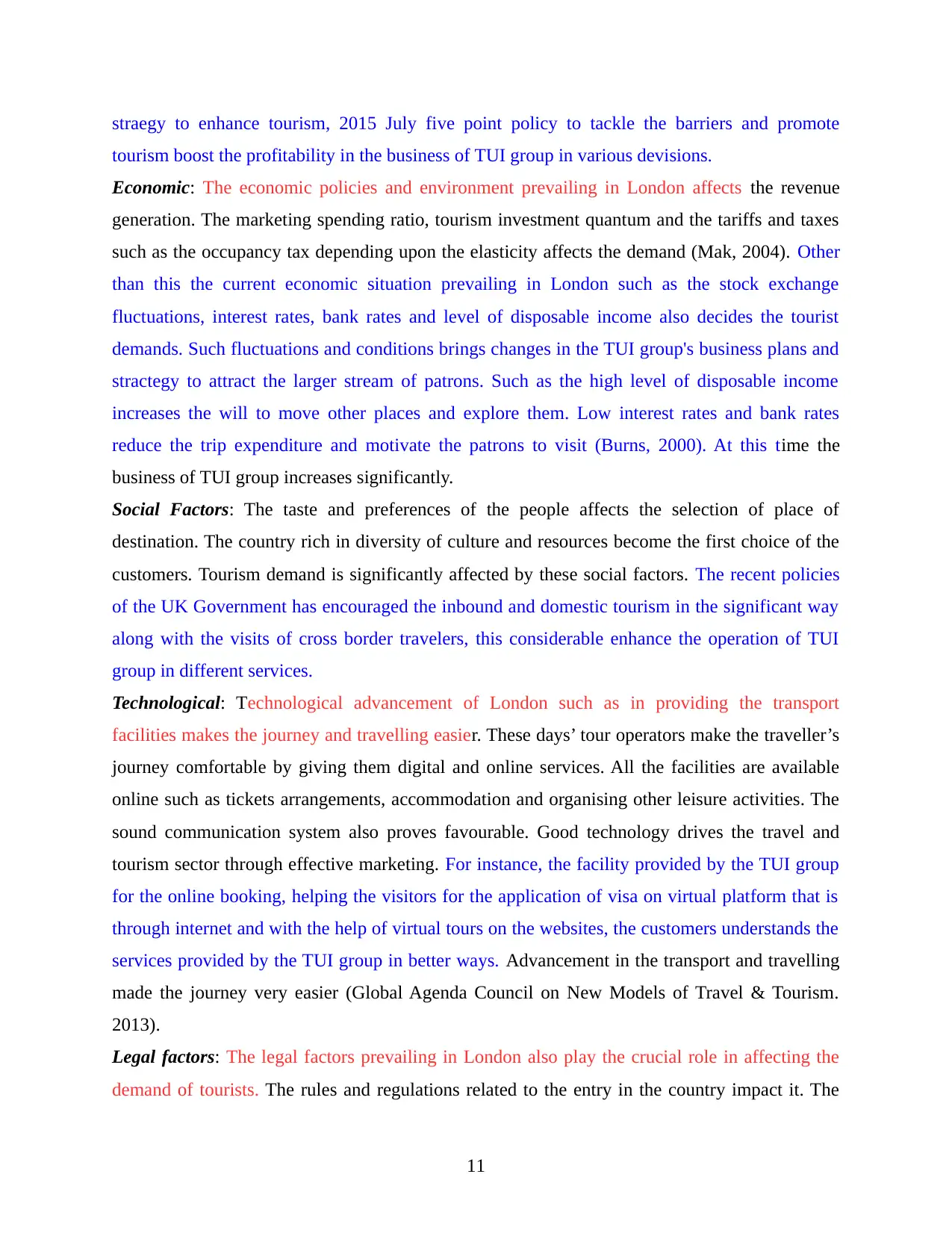
straegy to enhance tourism, 2015 July five point policy to tackle the barriers and promote
tourism boost the profitability in the business of TUI group in various devisions.
Economic: The economic policies and environment prevailing in London affects the revenue
generation. The marketing spending ratio, tourism investment quantum and the tariffs and taxes
such as the occupancy tax depending upon the elasticity affects the demand (Mak, 2004). Other
than this the current economic situation prevailing in London such as the stock exchange
fluctuations, interest rates, bank rates and level of disposable income also decides the tourist
demands. Such fluctuations and conditions brings changes in the TUI group's business plans and
stractegy to attract the larger stream of patrons. Such as the high level of disposable income
increases the will to move other places and explore them. Low interest rates and bank rates
reduce the trip expenditure and motivate the patrons to visit (Burns, 2000). At this time the
business of TUI group increases significantly.
Social Factors: The taste and preferences of the people affects the selection of place of
destination. The country rich in diversity of culture and resources become the first choice of the
customers. Tourism demand is significantly affected by these social factors. The recent policies
of the UK Government has encouraged the inbound and domestic tourism in the significant way
along with the visits of cross border travelers, this considerable enhance the operation of TUI
group in different services.
Technological: Technological advancement of London such as in providing the transport
facilities makes the journey and travelling easier. These days’ tour operators make the traveller’s
journey comfortable by giving them digital and online services. All the facilities are available
online such as tickets arrangements, accommodation and organising other leisure activities. The
sound communication system also proves favourable. Good technology drives the travel and
tourism sector through effective marketing. For instance, the facility provided by the TUI group
for the online booking, helping the visitors for the application of visa on virtual platform that is
through internet and with the help of virtual tours on the websites, the customers understands the
services provided by the TUI group in better ways. Advancement in the transport and travelling
made the journey very easier (Global Agenda Council on New Models of Travel & Tourism.
2013).
Legal factors: The legal factors prevailing in London also play the crucial role in affecting the
demand of tourists. The rules and regulations related to the entry in the country impact it. The
11
tourism boost the profitability in the business of TUI group in various devisions.
Economic: The economic policies and environment prevailing in London affects the revenue
generation. The marketing spending ratio, tourism investment quantum and the tariffs and taxes
such as the occupancy tax depending upon the elasticity affects the demand (Mak, 2004). Other
than this the current economic situation prevailing in London such as the stock exchange
fluctuations, interest rates, bank rates and level of disposable income also decides the tourist
demands. Such fluctuations and conditions brings changes in the TUI group's business plans and
stractegy to attract the larger stream of patrons. Such as the high level of disposable income
increases the will to move other places and explore them. Low interest rates and bank rates
reduce the trip expenditure and motivate the patrons to visit (Burns, 2000). At this time the
business of TUI group increases significantly.
Social Factors: The taste and preferences of the people affects the selection of place of
destination. The country rich in diversity of culture and resources become the first choice of the
customers. Tourism demand is significantly affected by these social factors. The recent policies
of the UK Government has encouraged the inbound and domestic tourism in the significant way
along with the visits of cross border travelers, this considerable enhance the operation of TUI
group in different services.
Technological: Technological advancement of London such as in providing the transport
facilities makes the journey and travelling easier. These days’ tour operators make the traveller’s
journey comfortable by giving them digital and online services. All the facilities are available
online such as tickets arrangements, accommodation and organising other leisure activities. The
sound communication system also proves favourable. Good technology drives the travel and
tourism sector through effective marketing. For instance, the facility provided by the TUI group
for the online booking, helping the visitors for the application of visa on virtual platform that is
through internet and with the help of virtual tours on the websites, the customers understands the
services provided by the TUI group in better ways. Advancement in the transport and travelling
made the journey very easier (Global Agenda Council on New Models of Travel & Tourism.
2013).
Legal factors: The legal factors prevailing in London also play the crucial role in affecting the
demand of tourists. The rules and regulations related to the entry in the country impact it. The
11
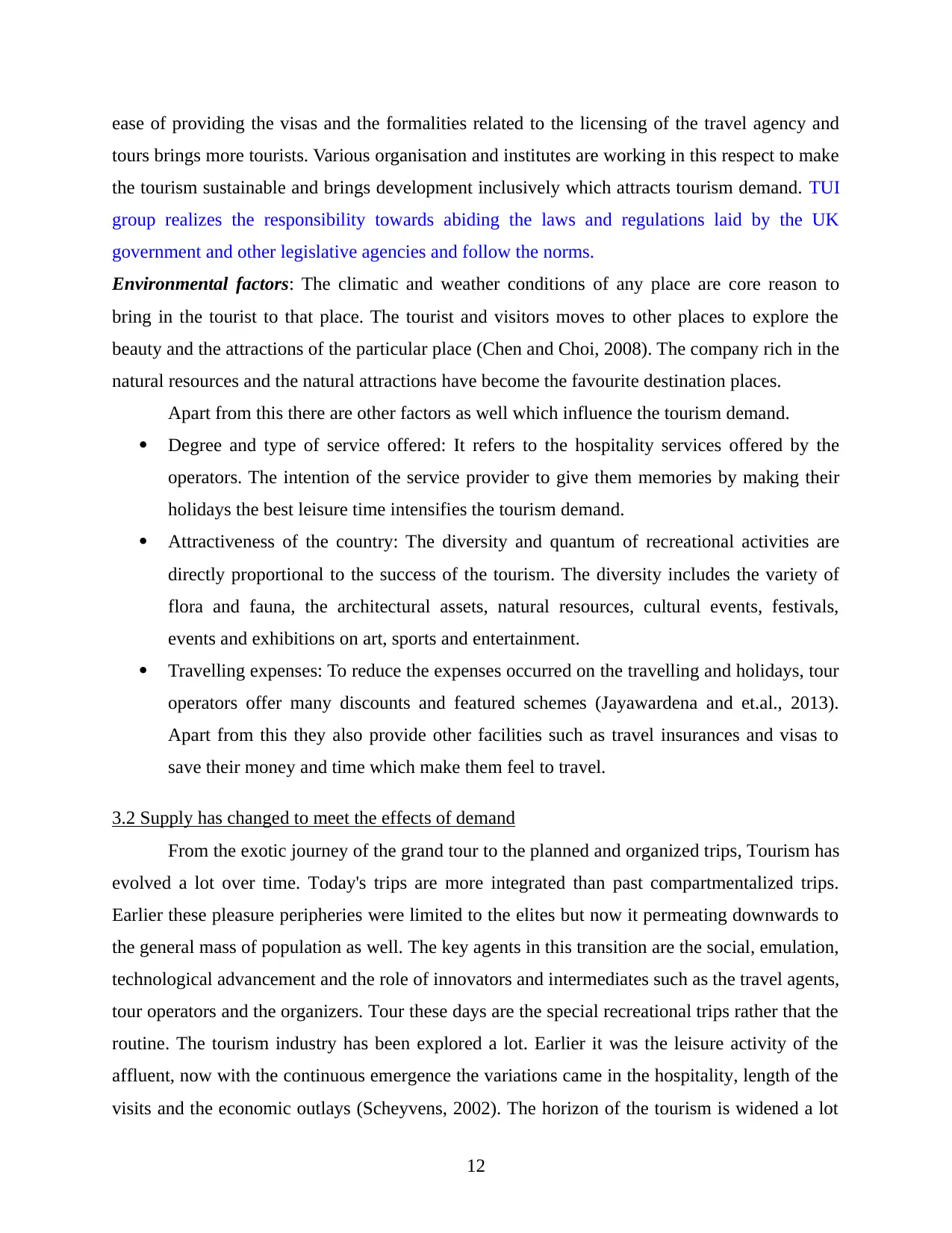
ease of providing the visas and the formalities related to the licensing of the travel agency and
tours brings more tourists. Various organisation and institutes are working in this respect to make
the tourism sustainable and brings development inclusively which attracts tourism demand. TUI
group realizes the responsibility towards abiding the laws and regulations laid by the UK
government and other legislative agencies and follow the norms.
Environmental factors: The climatic and weather conditions of any place are core reason to
bring in the tourist to that place. The tourist and visitors moves to other places to explore the
beauty and the attractions of the particular place (Chen and Choi, 2008). The company rich in the
natural resources and the natural attractions have become the favourite destination places.
Apart from this there are other factors as well which influence the tourism demand.
Degree and type of service offered: It refers to the hospitality services offered by the
operators. The intention of the service provider to give them memories by making their
holidays the best leisure time intensifies the tourism demand.
Attractiveness of the country: The diversity and quantum of recreational activities are
directly proportional to the success of the tourism. The diversity includes the variety of
flora and fauna, the architectural assets, natural resources, cultural events, festivals,
events and exhibitions on art, sports and entertainment.
Travelling expenses: To reduce the expenses occurred on the travelling and holidays, tour
operators offer many discounts and featured schemes (Jayawardena and et.al., 2013).
Apart from this they also provide other facilities such as travel insurances and visas to
save their money and time which make them feel to travel.
3.2 Supply has changed to meet the effects of demand
From the exotic journey of the grand tour to the planned and organized trips, Tourism has
evolved a lot over time. Today's trips are more integrated than past compartmentalized trips.
Earlier these pleasure peripheries were limited to the elites but now it permeating downwards to
the general mass of population as well. The key agents in this transition are the social, emulation,
technological advancement and the role of innovators and intermediates such as the travel agents,
tour operators and the organizers. Tour these days are the special recreational trips rather that the
routine. The tourism industry has been explored a lot. Earlier it was the leisure activity of the
affluent, now with the continuous emergence the variations came in the hospitality, length of the
visits and the economic outlays (Scheyvens, 2002). The horizon of the tourism is widened a lot
12
tours brings more tourists. Various organisation and institutes are working in this respect to make
the tourism sustainable and brings development inclusively which attracts tourism demand. TUI
group realizes the responsibility towards abiding the laws and regulations laid by the UK
government and other legislative agencies and follow the norms.
Environmental factors: The climatic and weather conditions of any place are core reason to
bring in the tourist to that place. The tourist and visitors moves to other places to explore the
beauty and the attractions of the particular place (Chen and Choi, 2008). The company rich in the
natural resources and the natural attractions have become the favourite destination places.
Apart from this there are other factors as well which influence the tourism demand.
Degree and type of service offered: It refers to the hospitality services offered by the
operators. The intention of the service provider to give them memories by making their
holidays the best leisure time intensifies the tourism demand.
Attractiveness of the country: The diversity and quantum of recreational activities are
directly proportional to the success of the tourism. The diversity includes the variety of
flora and fauna, the architectural assets, natural resources, cultural events, festivals,
events and exhibitions on art, sports and entertainment.
Travelling expenses: To reduce the expenses occurred on the travelling and holidays, tour
operators offer many discounts and featured schemes (Jayawardena and et.al., 2013).
Apart from this they also provide other facilities such as travel insurances and visas to
save their money and time which make them feel to travel.
3.2 Supply has changed to meet the effects of demand
From the exotic journey of the grand tour to the planned and organized trips, Tourism has
evolved a lot over time. Today's trips are more integrated than past compartmentalized trips.
Earlier these pleasure peripheries were limited to the elites but now it permeating downwards to
the general mass of population as well. The key agents in this transition are the social, emulation,
technological advancement and the role of innovators and intermediates such as the travel agents,
tour operators and the organizers. Tour these days are the special recreational trips rather that the
routine. The tourism industry has been explored a lot. Earlier it was the leisure activity of the
affluent, now with the continuous emergence the variations came in the hospitality, length of the
visits and the economic outlays (Scheyvens, 2002). The horizon of the tourism is widened a lot
12
⊘ This is a preview!⊘
Do you want full access?
Subscribe today to unlock all pages.

Trusted by 1+ million students worldwide
1 out of 21
Related Documents
Your All-in-One AI-Powered Toolkit for Academic Success.
+13062052269
info@desklib.com
Available 24*7 on WhatsApp / Email
![[object Object]](/_next/static/media/star-bottom.7253800d.svg)
Unlock your academic potential
Copyright © 2020–2025 A2Z Services. All Rights Reserved. Developed and managed by ZUCOL.





